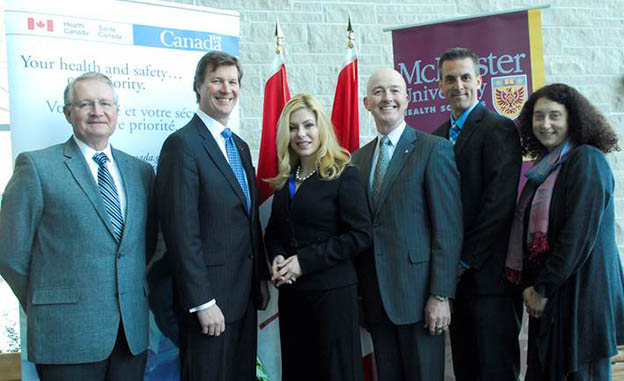Weaving community volunteerism into primary health care

At the Health Canada announcement of the Tapestry project were (from left): John Kelton, dean and vice-president of the Faculty of Health Sciences; David Price, chair of the Department of Family Medicine; Eve Adams, MP and Parliamentary Secretary to the Minister of Health; David Sweet, MP, Ancaster-Dundas-Flamborough-Westdale; Doug Oliver, associate professor of family medicine and a co-principal investigator of the Tapestry project; Lisa Dolovich, professor of family medicine and co-principal investigator of the Tapestry project.
Back in the day neighbours looked after each other, and that sense of community is behind a pilot project at McMaster University.
Trained community volunteers — supported by electronic health record technology — will work with the primary health team to improve the quality of life of older adults and at-risk individuals living on their own.
The TAPESTRY (Teams Advancing Patient Experience: Strengthening Quality) project will send community volunteers into the homes of seniors to pinpoint whether they need additional help, possible connection to Meals on Wheels or, if there’s an emerging health problem, contact their family doctor.
Health Canada funding of $6.5 million for the project was announced by Eve Adams, parliamentary secretary to Health Minister Rona Ambrose at a reception Feb. 19.
The research is led by professor Lisa Dolovich and associate professor Doug Oliver of the Department of Family Medicine of the Michael G. DeGroote School of Medicine.
“The TAPESTRY project holds great promise to combine community volunteerism with the latest electronic health record systems — the OSCAR system developed here at McMaster — to make important improvements in primary health care,” said Dr. John Kelton, Dean and Vice-President of Health Sciences. “This fits in with our Labarge Optimal Aging Initiative and other research priorities on aging here at McMaster.”
The project involves four key areas of research:
· -Finding ways to improve collaboration between primary health care teams and community resources
· -Training community volunteers to help patients link better with health care professionals
· -Using an electronic personal health record to communicate and exchange information
· -Helping patients better navigate the healthcare system
The project begins with the McMaster Family Health Team of the Department of Family Medicine and will eventually expand to five other communities across Canada. It is finding ways to combine the personal touch of volunteerism with the latest technologies to improve primary healthcare, said Dr. David Price, chair of family medicine.
Retired elementary school teacher Linda Gill, a community volunteer who visits seniors and vulnerable patients, said she enjoys helping them get personally involved in their own health and safety, adding older adults also appreciate having university students as volunteers.
In addition to funding from the federal government and the Labarge Optimal Aging Initiative, the project is supported by Ontario’s Ministry of Health and Long-Term Care (MOHLTC) and the McMaster Family Health Organization.
